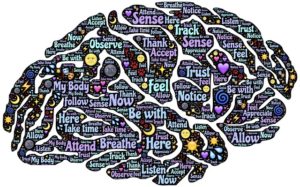Making Memories: Ways to delay, lessen severity of Alzheimer’s, dementia
(The following article was written for the November 2018 issue of Get Healthy magazine, a publication of The Northwest Indiana Times.)
Alzheimer’s disease. It’s a subject that hits close to home.
My mom died of it at age 86 after what was about 20 years of progressive symptoms, the last decade or so in a care facility.
Having a first-degree relative (mother, father, sibling) puts me at increased risk for developing Alzheimer’s. And though causes are myriad and treatment complicated, there are things I can do to at least delay the symptoms.
Dementia is a general umbrella term for loss of memory and other mental abilities severe enough to interfere with daily life. Alzheimer’s is a progressive decline of cognitive memory over a period of time. According to the Alzheimer’s Association, Alzheimer’s disease accounts for 60 to 80 percent of dementia cases. Vascular dementia, which occurs after a stroke, is the second most common dementia type. There are many other conditions that can cause symptoms of dementia, including some that are reversible. 
The Alzheimer’s Association 2018 Alzheimer’s Facts and Figures report states: more than 5.7 million Americans are living with Alzheimer’s; irreversible, it is the sixth leading cause of death in the United States; women are more likely to suffer from Alzheimer’s than men, comprising two-thirds of the patients.
Sarah Milligan, Care Consultant NW Indiana, Alzheimer’s Association Greater Indiana Chapter, states “Alzheimer’s disease is a public health crisis that the Alzheimer’s Association is poised to address at all levels, in Indiana and nationwide. We are the 3rd largest funder of research behind the U.S. and Chinese governments. The Association has $161 million invested across 25 countries working on a solution. Indiana currently has 7 active awards totaling $1.8 million.”
According to Dr. Stuart Zola, a leading neuroscientist and an expert in the study of Alzheimer’s disease and Professor of Psychiatry and Behavioral Sciences at Emory University School of Medicine, a brain with advanced Alzheimer’s is smaller than a healthy brain. Cell function in the diseased brain is disrupted, keeping neurons from communicating and impairing normal cognitive function. Cognitive impairments—problems with language, memory, thinking, and judgment beyond typical age-related changes—are related to the development of abnormal protein deposits in the brain. This typically develops gradually with the decline varying from person to person.
Risk factors
There are a number of risk factors, none of which mean that you are certain to get Alzheimer’s.
Starting with heredity, at least 27 genetic variations underlie Alzheimer’s. And though the presence of the gene apolipoprotein E e4 (APOE e4) linked to Alzheimer’s does not mean the person will get it, “those who have a mother, father or sibling with the disease, are at a 60 to 80 percent higher risk,” says Dr. Jaswinder Singh, Neuropsychologist at Mid-America Psychological and Counseling services, with offices in Merrillville and Munster.
That said, age is the greatest risk factor for developing Alzheimer’s, showing up in the largest numbers after 60-65. The Alzheimer’s Facts and Figures report states that one in 10 people age 65 and older (10 percent) has Alzheimer’s dementia.
“Head trauma may possibly exacerbate the disease in those who are already prone,” states Dr. Singh.
“Alzheimer’s is greater among the illiterate, making the case for intellectual activity. The theory behind this is that when we learn, we lay down more networks and connections in the brain. The more layering that occurs, the better equipped we are to fend off the effects of the disease.” Dr. Zola notes, “There is still memory loss, however the person has more reserve to draw from.”
Dr. Singh suggests that those who have an increased risk take a simple baseline assessment at age 50-55, and repeat the test every two to three years. He is firm in his belief that none of us needs to be afraid of doing this, since the earlier a correct diagnosis can be made, the better for the patient and their loved ones.
Disease links
According to Dr. Zola, numerous health risks increase the likelihood of developing Alzheimer’s. For one, metabolic syndrome, including obesity, high blood pressure, elevated blood sugar levels, and high triglycerides, contribute but can be controlled with diet and exercise.
Chronically elevated blood sugars (and blood insulin) seem to increase inflammation, as well as influence the size/development of the hippocampus, a brain structure essential to learning and memory. “There are many similarities in the brains of people with diabetes and Alzheimer’s,” says Dr. Zola.
Diagnosis
The Alzheimer’s Association states: “While most changes in the brain that cause dementia are permanent and worsen over time, thinking and memory problems caused by the following conditions may improve when the condition is treated or addressed: depression, medication side effects, excess use of alcohol, thyroid problems, and vitamin deficiencies.”
When it comes to diagnosing Alzheimer’s, Dr. Singh offers simple tests that assess whether the symptoms are those of depression, anxiety, medication related, or actually Alzheimer’s. Especially with males, a change in personality may indicate the early stages of Alzheimer’s. Other clues are: word finding difficulty, agitation or confusion that occurs around sunset, and loss of short-term memory.
Dr. Singh states, “As we age, it is normal to forget conversations, names of people, the name of that movie we saw last week, or the restaurant we dined in. That’s what we refer to as episodic memory.”
Dr. Zola says, “If we are wondering if we have Alzheimer’s, we’re probably fine. It’s when our family wonders and we aren’t aware of a problem, that there could be one.”
Ounce of prevention
Now that you know what you’re up against, there are some things you can do.
According to Dr. Singh, “Non-interrupted, restful sleep is one of the most important components of our lives and one which we often neglect. It is critical to rule out sleep apnea in those who snore or are overweight, since long-term untreated sleep apnea can lead to mild cognitive impairment. If you have sleep apnea, use a CPAP machine.” Power napping for a maximum of 20-30 minutes is beneficial, especially if you get 6 hours or less a night. Dr. Singh suggests developing good sleep habits: go to bed the same time each night; no TV in the bedroom; and couples may consider sleeping in separate rooms if one is restless, snores, or gets up several times a night, disturbing the other.
Change your diet to one that reduces inflammation, such as the Mediterranean diet. This includes foods that are rich in antioxidants, B vitamins, anti-inflammatory fats, plant nutrients, and lean protein. Think multicolored vegetables, fruits, olive oil, nuts, fish, poultry, eggs, herbs, and spices. Dr. Singh recommends eating fish three times per week, cooking with turmeric and ginger, consuming lots of fruits and vegetables that are dark blue, dark green, and dark red, and cutting out three white foods: sugar, salt and white flour. He believes that the Mediterranean way of eating is best for everyone. 
Exercise. Individuals who exercised one hour, three times a week for three months increased cerebral blood flow, enhanced memory, lowered blood pressure, and increased development of nervous tissue. Any activity—cooking, gardening, and walking—helps. “Even a 10-minute walk three days a week will increase blood flow in the frontal temporal region of the brain,” reports Dr. Singh.
Another big factor is social engagement. Those who are closely connected to others, have confidants, and solid people skills, can slow the progression of Alzheimer’s.
Learn new skills such as a foreign language or music, try new hobbies, and challenge yourself. Dr. Singh suggests that everyone follow the “twenty-second rule,” wherever they are, whatever their cognitive ability. “Before you leave your home, the restaurant, my office, take twenty seconds to scan the area to make sure you have all your belongings. It keeps you sharp, and you’re not running out the door and back in again to grab your car keys.”
Manage your stress by meditating, relaxing, having fun, being positive, spending time outdoors. Don’t smoke. Be mindful of alcohol use. While some people believe that doing crossword puzzles help prevent Alzheimer’s, Dr. Singh reminds us that those puzzles tap into long-term memory, not the short-term memory that is affected by the disease.
Sarah Milligan states, “With the current number of those affected and those who will be affected based on the present disease trajectory, everyone will know some one who has the disease. This is why it is so important for everyone to understand what Alzheimer’s disease and dementia is, the warning signs, and their potential risk of developing the disease. Especially given strong and growing evidence that maintenance and management of physical health and lifestyle factors is impactful in reducing risk.”
Note: Dr. Singh’s book, “How to Keep Your Memory Sharp in Old Age,” will be available early 2019.


